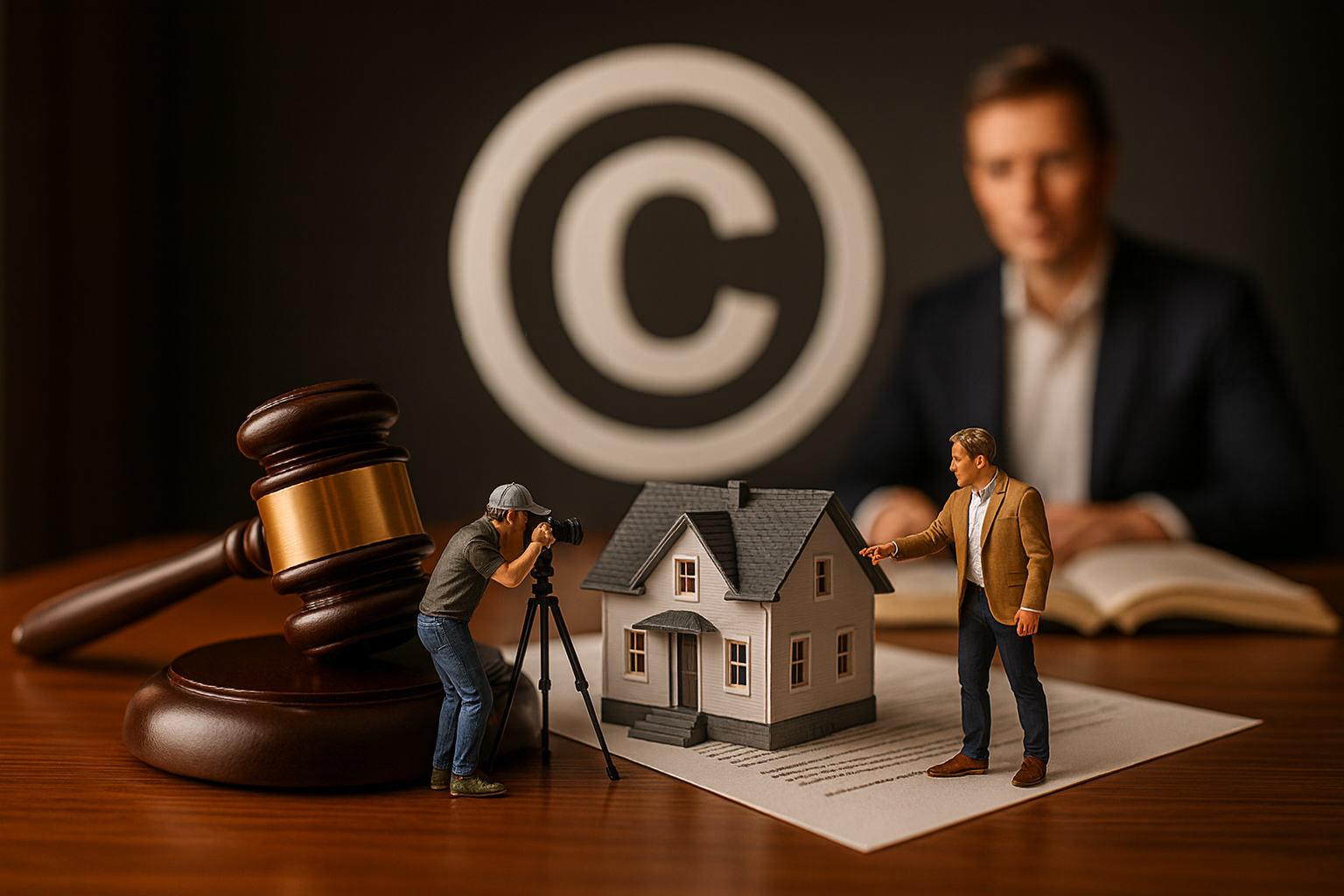The Real Estate Creative
Who Really Owns Your Listing Photos?
A Realtor’s guide to copyright, MLS rules, and avoiding costly mistakes with photos, video, 3D tours, and AI media.

Copyright & Licensing of Real Estate Photos, Videos, and 3D Tours (U.S.)
Realtors in the U.S. must navigate copyright law and ethical guidelines when using photos, videos, 3D tours, and other media in listings. Below, we break down who owns what, how licensing works, and best practices – including new tech like virtual staging or AI – to keep you on the right side of the law and the Realtor Code of Ethics.
TL;DR
Key Points
Copyright ownership: The creator (photographer, videographer, 3D tour provider) is the legal copyright owner by default — paying for the work doesn’t transfer copyright unless there’s a written agreement.
License vs Ownership: As an agent, you usually receive a license (permission to use media) rather than ownership. The license will define how, where, and how long you can use photos or videos.
MLS (Multiple Listing Service) rules: You must have “rights” to media before uploading to MLS (i.e. own the copyright or have a license).
MLSs cannot force you to transfer copyright; they can only require a license for their usage.
Misuse (e.g. uploading content without the correct permissions) can lead to fines, removal, or legal exposure.
Derivative works & modern media: Virtual staging, AI edits, slideshows etc. are derivative uses and usually require explicit permission in the license.
AI‐generated images (from scratch) typically aren’t copyrightable under current U.S. law.
Best Practices: Always get written agreements specifying copyright, licensing rights, duration, derivative permissions, etc.
Negotiate expanded/licensing rights up front if you need long‐term or broader usage.
Disclose virtual staging or AI enhancements so you aren’t misleading potential buyers.
Know your local MLS’s photo/media policies.
If unsure, consult an IP attorney. Legal risk (statutory damages, reputation, MLS penalties) isn’t worth guessing.
Who Owns the Media? (Photographers, Videographers & 3D Tours)
Under U.S. copyright law, the creator of a photo or video is the automatic copyright owner – even if you paid for the shoot. In real estate, this usually means:
- Photographs: The photographer holds the copyright by default. Simply paying for photos
does not transfer ownership or grant unlimited usage rights. Unless there’s a written agreement to the contrary, you only have a
license (permission) to use the images in limited ways, not ownership of the images.
- Videos: Similarly, the videographer (the person who shoots/edits the video) initially owns the copyright for the footage. Unless you have a contract assigning you the rights or a
work-for-hire arrangement (rare unless the videographer is your employee), you only get a license to use the video, not full ownership.
- 3D Tours / Floor Plans: Content like Matterport tours, virtual walkthroughs, or floor plan designs are also protected by copyright. The creator (e.g. the photographer who captured the 3D scan or the company that produced the floor plan) owns those rights unless transferred. (In fact, Matterport’s terms indicate Matterport
owns rights in its platform and possibly the models, while the scan images themselves are typically by the photographer. Always check provider terms.)
- “Work for Hire” exception: If the media was created by an
employee within scope of their job (or a specific written “work for hire” contract with an independent creator, which must use exact legal wording), then the employer (e.g. the brokerage or MLS) would own the copyright. For example, photos taken by an MLS’s own staff photographer can make the MLS the owner. But hiring a freelance photographer does
not automatically make it work-for-hire – you’d need a written agreement explicitly assigning copyright to you. Most real estate photo contracts do
not transfer ownership unless you negotiate and pay extra for it.
Bottom line: In almost all cases, the photographer/videographer owns the content and you, the agent or broker, have a limited license to use it for marketing that property. The homeowner typically has no copyright claim at all unless they themselves took the photos or hired the photographer directly and obtained rights.
What Your License Allows (and Forbids)
Because you likely don’t own the images/video, your usage is governed by the license you get from the creator. It’s critical to review the agreement with your photographer or videographer to know what’s allowed. Key points to look for:
- Allowed Uses: Most real estate photography contracts grant a license for
marketing the property for the duration of the listing. This typically includes using the photos in the MLS, on your brokerage or agent website, in flyers, and on third-party listing sites (Zillow, Realtor.com, etc.) during the active listing period. Some licenses also allow use in your personal portfolio or “sold” marketing once the home is sold, but
don’t assume – check the contract.
- Duration: Many licenses for listing photos are
temporary – e.g. valid until the property is sold (a “one-time use” license for that listing). After the listing ends, you
may not be allowed to reuse those photos for a new listing or a different property without permission. Always verify if the license expires at sale or after a certain time.
- Reuse & Transfer:
Using the images for a different property or project is usually prohibited unless you obtain a new license. For example, if you list the same home a year later (or a model home in a new phase), do
not just reuse the old photos unless the contract explicitly allows it or you get the photographer’s okay. Likewise, you typically
cannot transfer or sell the photos to another agent – e.g. if the listing expires and another agent takes over, your license
does not automatically extend to them. The next agent should hire the photographer or negotiate a license themselves.
- Alterations/Derivatives: Many photo licenses restrict making significant edits or creating
“derivative works.” For instance, adding your logo, applying filters, or virtually staging the photo might technically require the photographer’s permission. (Simply resizing or minor brightness adjustments are usually okay, but adding new elements – like digital furniture – is a gray area unless allowed by contract.) We discuss virtual staging more below, but
always check if your agreement forbids modifications. When in doubt, ask the photographer or get written permission.
- “All Rights” or Ownership Transfers: If you negotiated a full buy-out of rights (less common due to cost), the contract should explicitly state that
copyright is assigned to you or that it’s a “work made for hire.” This would let you use the photos indefinitely and in any manner. However, most agents
don’t have full ownership; they have a limited license. Don’t assume you own the media unless it’s clearly in writing.
Tip: Never assume anything that’s not in the contract. If a clause is unclear, get clarification. Some markets have standard photographer contracts or MLS-provided templates to help align expectations (e.g., NWMLS Forms 13 & 13A or NAR sample agreements). If your photographer doesn’t provide a written license, insist on one – handshake deals can lead to misunderstandings and lawsuits.
MLS Rules: Rights, Licensing, and Enforcement
MLSs in the U.S. have policies to ensure images and media in listings are used legally. In fact, the National Association of REALTORS® (NAR) has model rules on this that most MLSs follow. Here are the essentials:
- You Must Have Rights to Photos Before MLS Upload: NAR policy states that
before submitting a listing to MLS, the listing broker should own or have authority to publish all photos/images of the property. In plain terms, you either need to be the copyright owner or (more commonly) have a proper license from the photographer.
Do NOT upload photos you don’t have rights to. Many MLSs now require the listing agent to confirm this, and some even ask for proof (like an agreement or photographer’s name).
- MLS Cannot Force Copyright Transfer: If you’ve heard rumors that “by uploading to MLS you give up your copyright” – that’s
not exactly true. NAR rules
prohibit MLS from requiring you to
transfer ownership of your images as a condition of participation.
MLS can only ask for a license to use/distribute them as needed for listing services. In fact, any local MLS that tried to claim outright ownership of every uploaded photo would be violating NAR policy. (That misconception likely arose from agents misreading MLS fine print about licenses. A Reddit discussion notes you “can’t give away rights you don’t own,” debunking the idea that the Board of Realtors automatically owns your photos.)
- What MLS License Do You Grant?: When you input a listing, you typically grant the MLS (and its members) a
license to use your photos for MLS purposes – i.e. to include them in the MLS database, to display on other agents’ IDX websites, and to syndicate to portals, etc. This is necessary so MLS and other brokers can legally display the listing.
MLSs require you to warrant that you have the rights necessary to grant that MLS license. In practice, that means you need to have obtained a broad enough license from your photographer to cover MLS distribution (including other brokers’ sites and possibly third-party websites). If your photo contract was too narrow, you could inadvertently breach either the contract or MLS rules.
Always ensure your photographer’s license allows MLS syndication and IDX use. Most do, but double-check.
- MLS Photo Requirements & Verification: Some MLSs require at least one exterior photo for each listing. Some, like SmartMLS or the Austin Board of REALTORS®, have implemented
“photographer verification” programs. For example, photographers can register with the MLS and agree to a standard license, and agents can simply pick them from a list. If you use a non-registered photographer, you might need to
upload a copy of the license agreement for that listing. Failing to provide proof can lead to compliance notices or fines. This may feel burdensome, but MLSs enacted these rules to
protect agents from copyright infringement claims and ensure everyone is on the same page rights-wise.
- Indemnification: Be aware that when you submit content to MLS, you often agree to
indemnify the MLS and other participants for any copyright issues. If you upload photos without proper rights and the photographer later sues,
you (and/or your broker) could be on the hook for damages, not the MLS. This is another reason to
only use media you’re licensed to use – you don’t want to be the one paying statutory damages and legal fees for an unlicensed photo (which can be
up to $150,000 per work for willful infringement, under U.S. law).
- Handling Unauthorized Use (MLS Enforcement): In 2019, NAR required MLSs to adopt a process for
complaints of unauthorized use of listing content. This means if an agent believes another agent stole their photos (or other listing media), they can report it to the MLS. The accused agent must either remove the content or prove they had permission, typically within 10 days. MLSs can sanction rule-breakers (fines, etc.), and if they don’t comply, the complaining party can then take legal action.
Example: Agent A’s listing photos show up on Agent B’s new listing of the same property, but Agent B never licensed them – Agent A can file a complaint and Agent B will have to take them down or show a license. This internal MLS process supplements your rights under copyright law, making it easier to resolve these disputes without immediately going to court.
- Takeaway:
Yes, MLSs are enforcing copyright compliance. They aren’t literally forcing photographers to give up rights, but they
are requiring agents to
respect those rights and secure proper licenses. As a real estate professional, you should view the MLS rules as
aligned with copyright law – not an added hurdle. They’re there to remind you:
get permission, don’t steal images, and don’t put the MLS (or your fellow agents) at risk. If you follow best practices, these rules are easy to comply with.
Virtual Tours, Staging, and AI: Can You Legally Create Derivatives?
Modern real estate marketing often goes beyond static photos – you might use a slideshow video, virtual tour software, or virtual staging services. Are these uses legal under copyright? They can be, with the right permissions and ethical considerations:
- Virtual Tour Videos / Slideshows: If you take the listing photos and use a service (or software) to stitch them into a video tour or a slideshow (perhaps with background music), this is generally considered a permitted use
if your photo license allows reproduction for marketing. Most standard licenses for listing photos would cover creating a simple unaltered slideshow or tour, since it’s essentially another form of displaying the photos for the listing.
However, adding music could raise separate copyright issues (make sure any music is licensed for commercial use or use royalty-free tracks). Also, if the tour involves uploading photos to a third-party platform, ensure their terms don’t conflict with your license. (For example, if a tour platform claimed ownership of the photos upon upload – unlikely, but read their terms – that would be a problem since you can’t give them what you don’t own.)
- Virtual Staging (Digital Furniture or Renovations): Virtual staging involves
modifying the original photo – e.g. digitally adding furniture, decor, or changing paint colors. Legally, this creates a
derivative work of the original photo.
You need the photographer’s permission to make derivative works unless your license already grants it. Many real estate photo licenses
do not explicitly allow alterations beyond minor touch-ups, so this is a grey area. An intellectual property attorney on one forum put it bluntly: If you’re adding furniture to photos
you didn’t take, and you
don’t have a license to create derivatives, “it would potentially violate those photographers’ copyrights” (avvo.com). In practice, many photographers tacitly allow virtual staging for marketing as long as it’s disclosed, but to be safe,
get it in writing. Some photographers even offer virtual staging services themselves or will grant permission if asked. Always check your agreement or ask the photographer
before doing virtual staging on their images.
- Ethical Note: Besides legal permission,
transparency is key. The REALTOR®
Code of Ethics (Article 12) and many MLS rules require that images
present a “true picture” and not mislead. This means if you use virtually staged photos,
label them clearly and
also show the original, empty room. It’s usually fine to help buyers visualize a space with digital furniture – it can even benefit all parties – but failure to disclose alterations is an ethical violation (and can lead to fines or even legal claims if buyers feel misled). For example, Florida Realtors advises that virtually staged images should be watermarked or accompanied by the unstaged photo, and never digitally remove permanent flaws or change walls/floorplans.
Bottom line:
Only stage what you have permission to, and always be honest about it.
- AI-Enhanced or AI-Generated Images: With the rise of AI tools (like DALL·E, MidJourney, etc.), you might be tempted to use AI to enhance photos (sky replacements, virtual twilight, etc.) or even generate images (e.g. “what would this empty lot look like with a house on it?”). This is cutting-edge territory, but here’s what we know:
- Using AI on an existing photo: If you upload a photographer’s image into an AI tool to alter it, that’s essentially the same as any other editing – you need permission if it’s more than a minor enhancement. For example, using AI to remove large objects, change furnishings, or create a “renovated look” is a derivative work of the original photo. Make sure your license allows it or get consent.
- AI-creating a new image (from scratch): If an AI generates a wholly new image (say, a digitally created room scene) not directly derived from a specific copyrighted photo, you don’t have a traditional “photographer” to worry about.
However, who owns an AI-generated image? Currently in the U.S., purely AI-created images are generally
not copyrightable because there’s no human author. That means
nobody may own it – it could be public domain, or at least not enforceable by you. This is a murky area with ongoing legal cases. The practical upshot: if you use AI to generate marketing images,
be careful sharing them widely, as you might not be able to prevent others from reusing them (and you can’t copyright-claim an AI image yourself, as of now). Also, ensure you don’t violate any AI tool’s terms of service or use images that the AI created by
training on someone else’s copyrighted photos (there are lawsuits about AI tools scraping images without permission).
- Ethical use of AI: NAR legal experts have pointed to the
same ethical rules – Article 2 (no misrepresentation of property facts) and Article 12 (truth in advertising) – when using AI. For instance, it’s okay to show a buyer a hypothetical AI rendering of a renovated kitchen (with disclosure), but it’s
not okay to put an AI-altered photo in the MLS making the home look better than reality without telling people. Always “lead with transparency” if you use AI, and use it to
supplement, not deceive.
Tip: If you plan to use a photo in any “extra” way – feeding it to a virtual staging service, posting it on a design blog, making a meme, etc. – when in doubt, ask the photographer for permission. Many photographers are happy to grant expanded usage (possibly for a fee) rather than see you infringe. And if you work with certain real estate media companies, check their licensing terms; some offer broader usage rights that include things like social media, virtual tours, or even editing, whereas others are more restrictive.
MLS Demand for “Copyright Ownership” – Myth or Reality?
Some have asked if MLSs requiring copyright ownership is really happening, and if media providers (photographers/videographers) need to comply. This topic causes confusion, so let’s clarify:
- MLS Requirement: What MLSs
really require is that
the listing agent has the rights to license the content to MLS, not necessarily that the agent personally is the copyright owner. This means you must either own the copyright
or have obtained a sufficient license. For example, SmartMLS explicitly tells agents: “It is vital that you either
own the copyright or have the proper license to use any photos you upload” (smartmls.com). That doesn’t force the photographer to give up ownership; it just means the agent needs a license that covers MLS use.
- Enforcement on Agents, Not Photographers: The agreement is indeed between the MLS and the agent (and broker). The photographer or videographer isn’t a party to that agreement, so the MLS
can’t directly force a photographer to do anything (photogs don’t sign MLS user agreements). Instead,
the burden falls on the agent to secure necessary rights from the photographer. If an agent fails to, the MLS can penalize the
agent (fines, removal of listing, etc.), and the
agent could be the one in breach of contract or even facing an infringement lawsuit. So from the photographer’s perspective, the MLS rules are not “enforceable” on them per se – but they do affect whether an agent will hire them or how they structure their contracts. Many media providers have adapted by providing MLS-friendly licenses (knowing that if they didn’t, agents couldn’t use their photos in MLS and would go elsewhere). In some areas, photographers join “MLS partner” programs and sign a blanket license for MLS usage.
- Is Any MLS Grabbing Copyrights? Generally no – MLSs should not be demanding full transfer of copyright. In fact, NAR’s model rules
forbid MLS from requiring participants to surrender ownership rights as a condition of MLS access. The
one exception NAR allows is that an MLS may require you to grant a
license for MLS’s purposes (as discussed). If you encounter an MLS clause that sounds like they take ownership, it’s likely just poorly worded legalese about licensing. For instance, some may say “by uploading, you grant MLS the right to use, and you represent you have ownership or rights to do so.” This is about
warranty and license, not literal transfer. The Reddit rumor that the Board “now owns the copyright” once you upload is
misinformation. What’s true is: by uploading you
agree the MLS can use the photos (and that you’re liable if you didn’t have the right to grant that).
- Photographer Compliance: Photographers don’t
have to sign over anything to MLS directly. But if a photographer’s standard contract is so restrictive that it denies the agent the ability to put images on MLS or syndicate to Zillow, etc., that photographer will be unlikely to get business. In practice, photographers
need to provide licenses that align with MLS and marketing needs. A photographer who, say, refused to allow their images online at all would be incompatible with real estate marketing. So indirectly, market forces push media creators to “comply” with what the MLS and industry need (which is a broad license for listing marketing). Many real estate photographers explicitly state that the agent
can use the photos in MLS and for the sale of the property – which is exactly the right that MLS rules require the agent to have. If an MLS or association publishes recommended contract templates, it’s wise for both agents and photographers to use them or at least be aware of them.
In summary: There’s no widespread mandate that photographers give up their copyrights to the MLS. Instead, MLS rules are making agents more accountable for respecting copyright. Media creators don’t deal with the MLS directly, but they should support their agent clients by providing appropriate usage rights. The agent is the one who must attest they have permission – and it’s in everyone’s interest (agent, MLS, and photographer alike) that that’s true.
Best Practices for Agents: Stay Legal and Ethical
To wrap up, here’s a checklist of best practices for Realtors using photos, videos, and other media:
- Use Your Own or Licensed Media Only: Never pull images off Google, past listings, or anywhere else unless you have explicit permission. If a seller gives you photos (e.g. from a previous agent or their own snapshots),
do not assume you can use them. Verify who took them and get a license or new photos taken. Remember,
the safest course is to only upload content to MLS that you personally took or that you have written permission to use.
- Always Get a Written Agreement with Photographers/Videographers: The contract should spell out:
- Who owns the copyright (typically the photographer, unless otherwise stated).
- Your
license rights – where and how long you can use the images.
- Any restrictions (e.g. no third-party sale, no alterations without okay).
- Ideally, a clause that covers MLS/Internet use and allows sublicensing to MLS and portals as needed. (Many standard agreements now have this built-in. NAR and some MLSs provide sample language to ensure the photographer grants rights for MLS syndication.)
- What happens with any
“derivative” projects – for example, can you create brochures or videos from the photos? Can you crop or add text? It’s best if the contract explicitly permits typical marketing activities so you’re safe.
- Indemnity or liability: Some contracts might hold you (the client) responsible if you use the photos beyond the license. Be aware of this. It ties back to only using them as agreed.
- Know Your License and Respect It: Read the agreement! If it says “for this listing only,” do not use the photos on your next listing or for general promos. If it says “no alterations,” don’t crop out the watermark or virtually stage it without permission. One Realtor magazine article summed it up:
know what your licensing is so you don’t get in trouble; don’t assume you can reuse or keep using images beyond what was agreed. (realtyhack.com) When in doubt, contact the photographer for an extension or additional use license – most will accommodate for a fee, which is far cheaper than a lawsuit.
- Consider Negotiating Expanded Rights Upfront: If you anticipate needing the photos for more than just the MLS listing (say you want to use them in your long-term portfolio or farm marketing), talk to the photographer upfront. Some offer a buy-out or extended license option. As the RealtyHack blog suggests:
if there are photographers who give you broader rights, that can be a selling point
(realtyhack.com) – just ensure it’s in the contract.
- Educate Yourself on Local MLS Policies: Each MLS might have its own nuances. Some require you to credit the photographer in the MLS remarks or have a form signed. Others, as mentioned, require uploading the license agreement. Know the rules of your MLS (they often publish photo policies in member resources or ask your broker/association). Ignorance is not a defense if you violate them.
- Don’t Remove Other Agents’ Images or Watermarks: If you ever use an image that has a visible watermark or notice (or any copyright info in metadata),
don’t crop it out or ignore it. That’s a red flag for intentional misuse. Best practice is to only use content you have full rights to, but if you encountered a scenario where you think using another’s photo is justified (it’s hard to think of one – maybe a historic photo of a house?), get written permission
and give proper credit.
- Misuse Can Be Costly: There have been instances of agents getting sued or fined for copyright infringement even after they paid for photos. One Washington Realtors attorney noted that an agent “leased” photos for one purpose but had no right to give them to a third party who then used them forever – and that’s where lawsuits happen. If you use a photo beyond the scope (for example, allowing a builder to use your listing photos for their brochure without photographer permission), you could be liable. Penalties in federal court can reach
$750 to $150,000 per image depending on willfulness, plus attorney fees. And MLS can hit you with fines or suspension too. It’s not worth the risk – far cheaper to do it right.
- Leverage NAR/Association Resources: NAR and state Realtor associations have published
guidelines, videos, and articles on this topic (because it’s become a big issue in recent years). For example, NAR’s “Window to the Law” series has episodes on photo copyright, and many Realtor magazines (like Florida Realtors and others) provide
tips on virtual staging ethics and copyright. Staying up-to-date via these reputable sources will help you avoid pitfalls. If your brokerage offers training on intellectual property, take it.
- When Using Virtual Staging or AI – Disclose and Don’t Mislead: We covered this above, but it bears repeating as a best practice.
Always show the original photo alongside any digitally altered version (or at least make the original readily available). Clearly label “virtually staged” on images. Never try to pass off an AI-generated rendering as the actual condition of the property. Remember, Article 2 of the Code of Ethics prohibits concealing or misrepresenting material facts – heavily editing photos can cross that line if you’re not transparent.
- If in Doubt, Consult an Attorney: If you have a unique scenario (say a builder gave you professional photos to use, or you want to create a mash-up video with multiple photographers’ images), and you’re not sure about the rights, a quick consultation with an intellectual property attorney can save you headaches. As one lawyer advised in a Q&A,
“the facts in these cases really matter” (avvo.com) – a small change in circumstance can change what’s allowed. So when uncertain, get legal advice tailored to your situation.
Conclusion
Navigating copyright in real estate media is now a necessary part of a Realtor’s job. The era of casually reusing photos or assuming “I paid for it, so it’s mine” is over – the law, and MLS policies, make that clear. The good news is that by respecting creators’ rights and securing proper licenses, you can safely leverage professional photography, video, and 3D tours to market your listings effectively. It’s all about doing it the right way: get permission, follow your agreements, credit where required, and be transparent with consumers.
By following the guidelines above, you protect yourself from lawsuits and MLS sanctions, you maintain good relationships with the photographers and videographers who help your business, and you uphold the professional and ethical standards expected in your industry. In short, treat creators’ works as you’d want others to treat yours – with respect and care. Happy selling (with legally acquired visuals)!
This article is provided for informational purposes only and does not constitute legal advice. While every effort has been made to ensure accuracy, real estate laws and MLS policies can change. Realtors and brokers should consult with a qualified attorney or their local MLS for guidance on specific situations.
Sources:
- National Association of REALTORS® –
“Use of Photographs in a Multiple Listing Service” (MLS policy overview)
nar.realtor, nar.realtor
- NAR Handbook on MLS Policy –
Section 15 Ownership of Listing Content (participants can’t be forced to transfer copyright; must license to MLS)
nar.realtor
- NAR –
“Copyright Considerations for MLS Photographs” (explains who owns photos in various scenarios)
nar.realtor, nar.realtor
- Washington REALTORS® –
“You Paid for the Image and Still Got Sued for Using It?” (legal article on photo licensing in listings)
warealtor.org,
warealtor.orgwarealtor.org
- SmartMLS (Connecticut) –
Photographer FAQ (MLS requires license agreement; compliance rules)
smartmls.com,
smartmls.com
- RealtyHack Podcast Blog –
“Don’t Get Sued over Realty Photos” (discusses photo ownership and ABoR’s photographer partnership)
realtyhack.com,
realtyhack.com,
realtyhack.com
- Reddit r/realtors –
Discussion on listing photo copyright (industry perspectives debunking myths about ownership)
reddit.com,
reddit.com
- Avvo Legal Answers –
“Is virtual staging a violation of copyright law?” (IP lawyers’ advice confirming derivative works need permission)
avvo.com
- REALTOR® Magazine –
“Using AI to Enhance Listing Photos Can Be Legally Risky” (NAR legal forum highlights on AI, Nov 2022)
nar.realtor,
nar.realtor
- Florida Realtors – “3 Things to Know About Virtual Staging” (Article on ethical use of virtual staging, 2025) floridarealtors.org, floridarealtors.org









